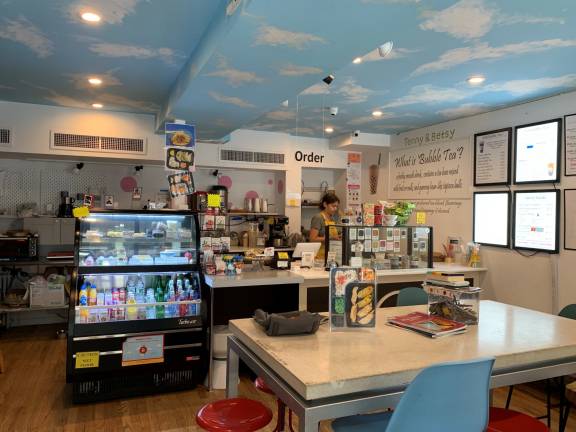the bubble tea solution

Upper East Side café Tenny & Betsy is a one-stop shop for artsy kids with a sweet tooth. Located at 197 East 76th Street just off of Third Avenue, the café specializes in bubble tea, an Asian delicacy that the shop describes as “a frothy smooth drink,” made with “a tea based mix with fruit or milk and gummy bear-like tapioca balls.” Tenny & Betsy also offers an interactive experience: sketch pads and drawing utensils sit on a long table, inviting kids to sit down on one of the stools to doodle or sketch. Some of these colorful drawings are displayed on the wall below Polaroids of kids taken at birthday parties and other celebrations held at the café. Tenny and Betsy’s menu pays homage to neighboring schools, which surely sends Hewitt girls clamoring to order their school’s namesake “The Hewitt Special”: one cupcake, a passion fruit tea, and a strawberry pop for the price of ten dollars. Also on the menu is “The Wagner Special,” a tribute to nearby Robert F. Wagner Middle School, which includes a bento box and a bubble tea with one topping for $15.
Atop the café lives its owner, Jennifer Gao. Born and raised in Shanghai, Gao came to the United States when she was 18 years old. Her resume includes a degree in business, chief concierge at a five-star hotel in Memphis, and positions in marketing and sales for American Express for over a decade. Three years ago, she opened Tenny and Betsy.
As Gao serves flavored milk tea with tapioca balls to UES families, storefronts in the neighborhood are emptying faster than new occupants can move into them. In this inauspicious climate, Tenny & Betsy offer a window into what it is like to operate a small business. By working with other local businesses and engaging the neighborhood’s residents, Gao believes that Tenny & Betsy — and other small businesses on the UES — can evade the fate of their counterparts who have shuttered their doors.
Collaborative StrategyA critical ingredient to Gao’s business strategy is collaboration between seemingly-competing local businesses. “Today’s consumers, our interests are so diverse there’s no one-purpose trip. We go out to make multi-purpose trips,” she explained. “People will come here and say hey, I’m going to buy some shoes and look for baby clothing, oh by the way I can have some bubble tea to take a break,” she said.
To put her plan into practice, Gao solicited the promotion of a nearby Chinese restaurant: “I gave them my brochures and said, ‘You don’t really serve dessert, direct [people] to me after dinner.’” Next, she worked with a man running a fruit concession on her block. She told him: “If [people are] looking for anything other than Starbucks as an alternative, point them to me.” Gao said the man was very welcoming to the idea and she credited his help to bringing more traffic to her store. “Obviously I gave him samples of my bubble tea pretty regularly,” she laughed.
Under this strategy, however, if one storefront founders, neighboring stores also suffer. Empty storefronts, Gao said, contribute psychologically to the ethos of the block. “Clusters of empty spaces in the neighborhood just make it look dead,” she said. There are currently three empty storefronts on her block. Though Third Avenue and 76th Street was a busy block just a few years ago, today restaurants such as onetime favorites Haru and Atlantic Grill are gone.
“We used to have people on weekend evenings [when] families would go to dinner at Haru right across the street and they [would] walk by my store afterwards for dessert,” Gao said. Tenny & Betsy lost this clientele when Haru closed in 2018.
Haru and Atlantic Grill could not renew their leases due to Northwell Health’s purchase of the retail and residential properties on Third Avenue between East 76th and East 77th Streets. Northwell Health, which owns Lenox Hill Hospital, is transforming the block with a massive construction project that Gao thinks could last years. If empty storefronts portend poorly for nearby businesses, nearby construction is their bane. Gao noted the noise, dirt, and debris that construction contributes to the air in addition to “horrendous” traffic with “people honking.” “It won’t be the most pleasant environment for a few years,” she said.
Competing with Starbucks Though Gao believes collaboration with nearby businesses is mutually beneficial, she feels pressure to compete with national corporations that have branches on the UES. “It’s a lot of sweat and tears to go into [my business] when I compete against Starbucks, Dunkin Donuts, Joe & The Juice, Maison Kayser, you just name it.” While Upper East Siders mourn the loss of small businesses — and with them the erosion of their neighborhood’s character — they continue to frequent chains like Starbucks. “People don’t really appreciate the importance of small businesses,” Gao lamented.
At the same time, Gao is confident that her café brings an experience to Upper East Siders that chains are unable to provide. “I’m hopeful because this concept is ... a little more quirky, a little artsy,” she said. “The Upper East Side is very family-oriented; bubble tea is something that interestingly brings the family together. I can’t explain why, but bubble tea is just a fun drink.” Gao said that customers tell her that her café is filling a void in the neighborhood: “We don’t have a place on the Upper East Side for kids and for families. It’s about time we have a place like this.”
When Gao walks outside in the morning to open Tenny and Betsy, empty storefronts and construction greet her, harbingers of the end of small business on the UES. She perseveres, however, believing that her café is preserving the character of her neighborhood.